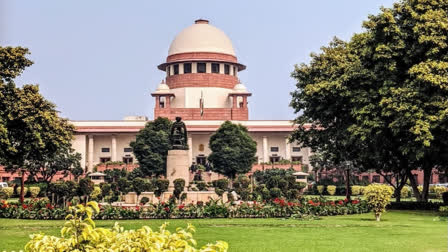New Delhi:The courts dealing with the issue of habeas corpus regarding a minor can't treat the child as a "movable property" and transfer their custody without even considering the impact of disturbance of custody on them, the Supreme Court said on Friday. A habeas corpus petition is filed seeking direction to produce before the court a person who is missing or has been illegally detained.
A bench of Justices A S Oka and A G Masih said such issues cannot be decided mechanically and the court has to act based on humanitarian considerations. "When the court deals with the issue of habeas corpus regarding a minor, the court cannot treat the child as a movable property and transfer custody without even considering the impact of the disturbance of the custody on the child," the bench said.
The top court delivered its verdict in a case pertaining to the custody of a girl child who is aged two years and seven months. Her mother died an unnatural death in December 2022 and she is presently in the custody of her maternal aunts. A petition was filed in the apex court challenging the June 2023 judgement of the Madhya Pradesh High Court, which had directed the maternal aunts to hand over custody of the child to her father and paternal grandparents.
The bench noted that in July last year, the top court had granted a stay of the operation of the high court's verdict. The apex court observed the high court was dealing with custody of a child who had been in the custody of her maternal aunts from the tender age of 11 months after her mother died.
"It is apparent that the high court has not dealt with and considered the issue of the welfare of the child. The high court has disturbed the child's custody based only on the father's right as a natural guardian," the bench noted. It noted that as far as the decision regarding custody of a child was concerned, the only paramount consideration was the welfare of a minor and the parties' rights cannot be allowed to override the child's welfare.
"We believe that considering the peculiar facts of the case and the child's tender age, this is not a case where custody of the child can be disturbed in a petition under Article 226 of the Constitution of India," it said. The bench said only in substantive proceedings under the the Guardians and Wards (GW) Act, 1890 can the appropriate court decide the issue of child custody and guardianship.
It said a regular civil/family court dealing with child custody cases was in an advantageous position and the court can frequently interact with the child. The bench said, at this stage, it would be very difficult to decide whether the welfare of child requires custody of the maternal aunts to be disturbed.
"The child has not seen the father and grandparents for over a year. At the tender age of two years and seven months, if custody of the child is immediately transferred to the father and grandparents, the child will become miserable as the child has not met them for a considerably long time," it said.
The apex court said whether the father was entitled to custody or not was a matter to be decided by a competent court, but surely, even assuming that he was not entitled to custody, at this stage, he was entitled to have access to meet the minor. "We propose to direct the appellants to give access to the father and paternal grandparents of the child to meet the child once a fortnight," the bench said.
It directed that on every first, third and fifth Saturday starting from September 21, the maternal aunts shall take the child to the office of the secretary of the District Legal Service Authority (DLSA) at Panna in Madhya Pradesh at 3 pm. The bench said under the supervision of the DLSA secretary, the father and grandparents of the child shall be permitted to meet her till 5 pm.
"As assured to the court, the appellants or some of them shall file a petition seeking a declaration of guardianship and permanent custody of the child under the provisions of the GW Act before the competent court within a maximum period of two months from today," it said.
